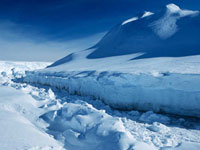State of the Climate in Asia 2024
<p>The World Meteorological Organization’s State of the Climate in Asia 2024 report warns that the region is warming nearly twice as fast as the global average, driving more extreme weather and posing
<p>The World Meteorological Organization’s State of the Climate in Asia 2024 report warns that the region is warming nearly twice as fast as the global average, driving more extreme weather and posing
If current trends continue, some of the lower-altitude glaciers of the tropical Andes could lose between 78 and 97% of their volume by the end of the century, reducing the region’s available freshwater
DEHRADUN: A recent study by the Dehradun-based Wadia Institute of Himalayan Geology (WIHG) has found that black carbon travelling from Mediterranean countries during the western disturbance (which brings
Melting of ice shelves in West Antarctica speeds up and slows down in response to changes in deep ocean temperature, and is far more variable than previously thought, according to new research published
<p>In summer (pre-monsoon) of recent years, low water level among the last few decades, has been observed in several lower Indian reaches of the Ganges (or Ganga) river (with estimated river water level
A domino-like cascade of melting ice, warming seas, shifting currents and dying forests could tilt the Earth into a “hothouse” state beyond which human efforts to reduce emissions will be increasingly
When a glacial lake burst in Pakistan's northern Gilgit-Baltistan province in July, Sher Baz watched helplessly as the waters swept away his family home. Residents of Badswat village, which lies in
We know that humans are causing Earth’s climate to change. It used to be that “climate change” mostly referred to increasing temperatures near the Earth’s surface, but increasingly, climate change has
<p>Nioghalvfjerdsfjorden is a major outlet glacier in Northeast-Greenland. Although earlier studies showed that the floating part near the grounding line thinned by 30% between 1999 and 2014, the temporal

The melting of Antarctica is accelerating at an alarming rate, with about 3 trillion tons of ice disappearing since 1992, an international team of ice experts said in a new study. In the last quarter
Ice melting in Antarctica is causing sea levels to rise at a massive rate and the frozen continent has lost about 3 trillion tonnes of ice in the last 25 years. Warning that its rate of melting is